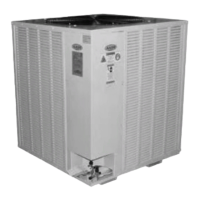corner of the unit is recommended for
service.
Figure 2 – Condensing Unit Clearances
Condensing units should not be installed in
an enclosure or pit that is deeper than the
height of the unit. When recessed
installation is necessary, the clearance to
maintain proper airflow is at least three feet.
CB Series condensing units are single
circuited with vertical air discharge. There
must be no obstruction above the equipment.
Do not place the unit under an overhang.
Placement relative to the building air intakes
and other structures must be carefully
selected. Consider the effects of outdoor fan
noise on conditioned space and any adjacent
occupied space. It is recommended that the
unit be placed so that discharge does not
blow toward windows less than 25 feet
away.
Heat pumps require special location
consideration in areas where snow
accumulation can become an obstruction
and in areas with prolonged continuous
subfreezing temperatures. Heat pump unit
bases are cutout under the outdoor coil to
permit drainage of frost accumulation. The
unit must be situated to permit free
unobstructed drainage of the defrost water
and ice. A minimum 3 inches clearance
under the outdoor coil is required in the
milder climates. In more severe weather
locations, it is recommended that the unit be
elevated to allow unobstructed drainage and
airflow.
Table 1 - Recommended Elevation
Minimums
Suggest Minimum
Elevation
Mounting Isolation
For roof mounted applications or anytime
vibration transmission is a factor, vibration
isolators may be used.
Access Panel
Access panel is provided to electrical
compartment. To remove the panel,
unscrew the four screws
PVC PIPING
PVC (Polyvinyl Chloride) and CPVC
(Chlorinated Polyvinyl Chloride) are
vulnerable to attack by certain
chemicals. Polyolester (POE) oils
used with R-410A and other
refrigerants, even in trace amounts,
in a PVC or CPVC piping system will
result in stress cracking of the piping
and fittings and complete piping
system failure.

